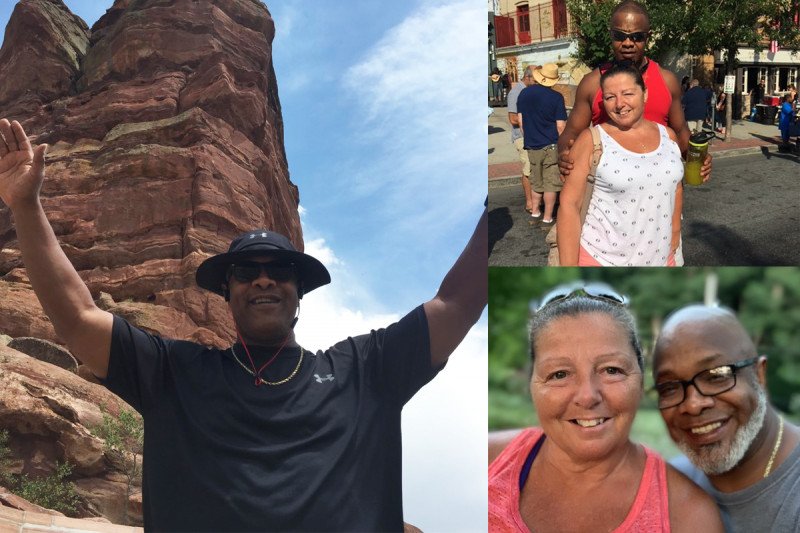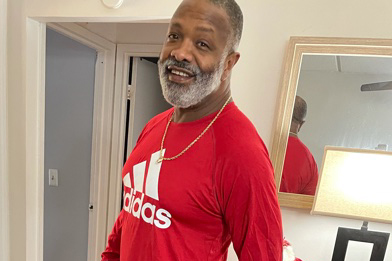
Getting hit by a bus saved Christopher Jeter’s life.
In 2011, when the 54-year-old inventory manager took his brand-new motorcycle for a spin, he collided with a public transit bus. Incredibly, he left the scene mostly unscathed. But doctors in the emergency room near his home in Westchester County, New York, unearthed a bigger problem. A CT scan to check for internal damage revealed a suspicious spot on Christopher’s right lung. He had immediate surgery to remove it.
The biopsy after surgery showed that Christopher had stage I lung cancer. He immediately decided where to be treated.
“You learn fast that when it’s a spot on your lung, it could be life or death, so act fast,” says the married father of a 20-year-old daughter and 25-year-old son. “I chose Memorial Sloan Kettering because it has a reputation for the best cancer treatment.”
Christopher says he appreciated that his MSK thoracic surgeon, Manjit Bains, was “brutally honest.” Thankfully, he learned he did not need chemotherapy or additional cancer treatment after his initial surgery.
“Dr. Bains wasn’t one to sugarcoat things,” Christopher says. “He had a large presence and I liked that. When he said, ‘You’re going to be OK,’ I believed that I would be.”
An Exciting Milestone
After five years of monitoring Christopher’s health, Dr. Bains saw no signs of cancer. He transferred Christopher to MSK’s Adult Survivorship Program for a different kind of monitoring. The advanced practice providers (APPs) in Survivorship specialize in caring for people after they finish active cancer treatment, when patients may face a different set of issues. These experts emphasize how to live well after cancer. They help patients manage any residual side effects after treatment and monitor them closely for signs of recurrence. They also recommend screenings for other cancers, since people who have survived one cancer might be at a higher risk than the general public for another cancer. The APP assigned to each patient is an expert in their particular kind of cancer so they can create a plan tailored to their specific needs.

Christopher was understandably nervous to enter a new phase of care with a new provider.
“That was quite scary,” he says. “I thought, Dr. Bains has a very good reputation and now you’re moving me away from him?”
But in MSK’s Adult Survivorship Program, a patient’s first MSK doctor works closely with the new provider to ensure a smooth transition. Most importantly, patients’ primary MSK physicians are just a phone call away should anything require more follow-up. Moving into Survivorship doesn’t mean a patient is losing their current provider; rather, another expert is joining their care team.
‘I Felt Confident’
Amy Devigne, Christopher’s Survivorship APP, understands the anxiety that comes with seeing someone new.
“I try to reassure survivors that their oncologist is still their oncologist,” she says. “They are always a patient here, and if anything comes up, we work with their doctor. Their care is centralized.”
As soon as Christopher met Ms. Devigne, he says he knew he was in good hands.
“I felt confident,” he says. “She’s a specialist in everything that comes after cancer care. That was the key for me.”
Three years after Christopher joined the Adult Survivorship Program, something happened that showed the benefit of carefully monitoring patients in this new phase of life after cancer. Christopher told Ms. Devigne his chest had been hurting. She ordered a CT scan and reviewed it with Dr. Bains.
“Amy said there was scar tissue but reassured me the scan was OK,” he recalls. “She took care of me, and that’s just what she does: Amy shows that she really cares about people, and she is an expert at making me, personally, feel good.”
Home Team Advantage
Although some patients may want to be monitored or get scans at other institutions, Ms. Devigne says there is an advantage to staying with MSK.
“We have prior scans that we can compare,” she says. “Sometimes the things we see are minimally changed or stable, so it’s safe for us to continue surveillance. We don’t want to unnecessarily act on something another internist might be concerned about.”
Christopher has annual checkups with Ms. Devigne, where they make sure he is up to date on other health screenings like those for prostate cancer and colon cancer. He often has follow-up scans at MSK Westchester, near his home.
Christopher and his wife plan to move to Florida within the next year. Sometimes when Survivorship members move away, they can opt to undergo testing locally and have the results sent to MSK. They can then have follow-up visits with their MSK provider via telemedicine.
But that’s not what Christopher wants. He says he will travel far and wide to see Ms. Devigne.
“She sits me down, tells me what’s going on, and reassures me that I’m fine,” he says. “It’s so comforting.”



